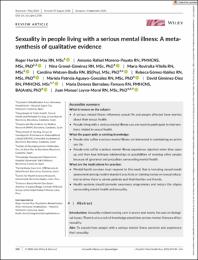Mostrar el registro sencillo del ítem
Sexuality in people living with a serious mental illness: A meta-synthesis of qualitative evidence
| dc.contributor.author | Hortal-Mas, Roger | es_ES |
| dc.contributor.author | Moreno-Poyato, Antonio Rafael | es_ES |
| dc.contributor.author | Granel-Giménez, Nina | es_ES |
| dc.contributor.author | Roviralta-Vilella, Maria | es_ES |
| dc.contributor.author | Watson-Badia, Carolina | es_ES |
| dc.contributor.author | Gómez-Ibáñez, Rebeca | es_ES |
| dc.contributor.author | Aguayo-González, Mariela Patricia | es_ES |
| dc.contributor.author | Giménez-Díez, David | es_ES |
| dc.contributor.author | Bernabeu-Tamayo, Maria Dolores | es_ES |
| dc.contributor.author | Leyva-Moral, Juan Manuel | es_ES |
| dc.date.accessioned | 2022-10-12T18:20:40Z | |
| dc.date.available | 2022-10-12T18:20:40Z | |
| dc.date.issued | 2020-09-03 | |
| dc.identifier.uri | https://hdl.handle.net/20.500.13053/6857 | |
| dc.description.abstract | “Introduction: Sexuality-related nursing care is scarce and mainly focuses on biological issues. There is also a lack of knowledge about how serious mental illnesses affect sexuality. Aim: To explain how people with a serious mental illness perceive and experience their sexuality Method: A meta-synthesis was conducted to integrate qualitative studies. Four databases were used to perform the search, focused in the last ten years. Nine articles were included, and their results analysed thematically. Results: Four categories were identified: ““Pathologized sexuality,““ which explains how the disorder and treatment affect sexuality; ““Not my sexuality anymore,” which describes feelings emerging from the perceived limitations and the role of self-acceptance; “Learning to manage intimate relationships,” which explains the desire to establish intimate personal relationships and define their meaning; and ““Reconstructing my sexuality,““ which elucidates the influence of the environment on sexuality. Discussion: Sexuality is influenced by several factors, the main ones being: the clinical complications, the side effects of drug treatment, the social support, the relationship with the health sector and stigma. Implications for practice: Having a serious mental illness affects sexuality and can provoke suffering and social isolation. Mental health services should address this issue and carry out community interventions to reduce stigma.“ | es_ES |
| dc.format | application/pdf | es_ES |
| dc.language.iso | eng | es_ES |
| dc.publisher | John Wiley and Sons Inc | es_ES |
| dc.rights | info:eu-repo/semantics/openAccess | es_ES |
| dc.rights.uri | https://creativecommons.org/licenses/by/4.0/ | es_ES |
| dc.subject | bipolar disorder, psychiatric nursing, qualitative research, quality of life, schizophrenia, severe mental disorder, sexuality | es_ES |
| dc.title | Sexuality in people living with a serious mental illness: A meta-synthesis of qualitative evidence | es_ES |
| dc.type | info:eu-repo/semantics/article | es_ES |
| dc.identifier.doi | https://doi.org/10.1111/jpm.12700 | es_ES |
| dc.type.version | info:eu-repo/semantics/publishedVersion | es_ES |
| dc.publisher.country | GB | es_ES |
| dc.subject.ocde | http://purl.org/pe-repo/ocde/ford#3.03.00 | es_ES |
Ficheros en el ítem
Este ítem aparece en la(s) siguiente(s) colección(es)
-
SCOPUS [380]


